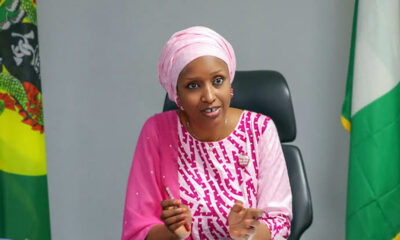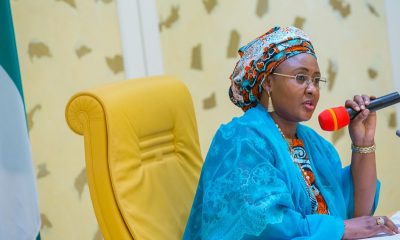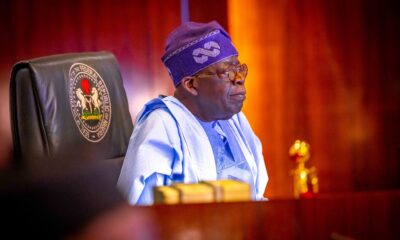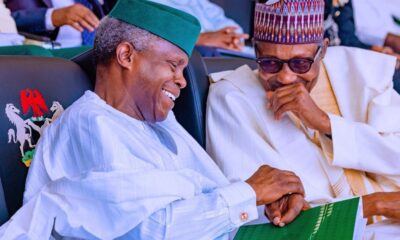News
Govs to Buhari: Sack workers aged 50yrs, levy anyone earning over N30,000
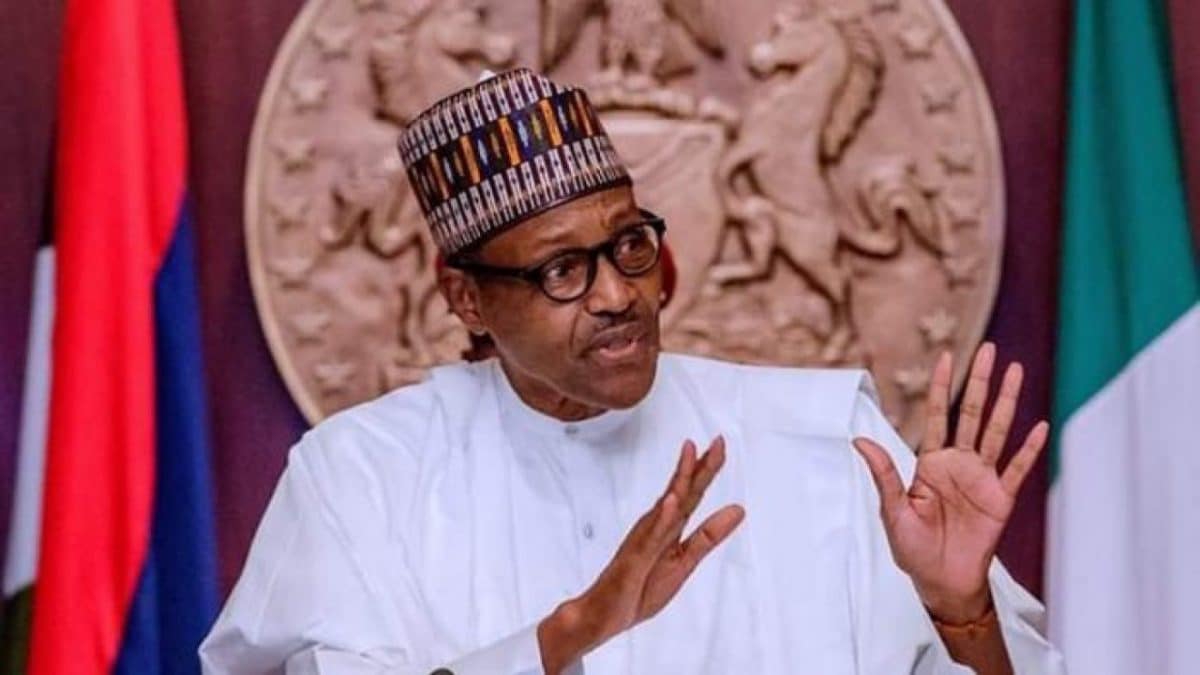
In a bid to prevent the nation from imminent economic collapse, the Nigerian governors have advised the federal government to retire all federal civil servants who are older than 50 years.
The governors also want the government to raise taxes across boars as well as levy anyone earning N30,000 and above monthly.
The governors made the proposal at a meeting with President Muhammadu Buhari in July, an online publication, PREMIUM TIMES exclusively gathered from sources privy to details of the meeting.
The proposal also urged the government to begin implementation of the updated Stephen Oronsaye Report, which suggested merger and shutdown of agencies and parastatals with duplicated or contested functions as a way to address bureaucratic inefficiency and reduce the cost of governance.
Officials familiar with details of the meeting, who spoke to PREMIUM TIMES, explained that the governors were concerned about the deteriorating state of the economy and a proposal to restore fiscal discipline was presented to the federal government.
The federal civil service employs just about 89,000 people but will spend about N4.1 trillion on personnel costs this year, from its N17 trillion budget for the entire country. It is not clear how many workers are above 50 years of age, or how much goes to them.
The suggestion comes as indications emerge that the nation may be teetering towards the cliff of economic collapse.
The online publication had reported that Nigeria’s external reserves amount to only $15 billion, well below the $36 billion balance on the gross external reserves claimed by the bank. With the nation spending N5.9 trillion on imports in the first quarter of the year, reserves of $15 billion would barely cover four months of import.
Last week, details emerged that the balance in Nigeria’s Excess Crude Account had depleted significantly from $35.37m to $376,655, leaving the nation with no buffers to stabilize the economy and its currency. Yet another indication emerged recently that the nation was broke as debt service surpassed revenue.
READ ALSO:
- FG can’t borrow N1.1trn to end ASUU strike – Keyamo
- Gunmen Abduct 3 Children in Kogi, Demand N100m Ransom
- N26bn Debt: Court Grants Access Bank’s Request to Take over Sunny Odogwu Properties
According to details of the 2022 fiscal performance report for January through April, Nigeria’s total revenue stood at N1.63 trillion while debt servicing stood at N1.94 trillion, showing a variance of over N300 billion.
As part of measures to restore fiscal discipline, the governors advised the federal government to reduce expenditure immediately by eliminating petrol subsidy and NNPC-funded projects, cap the Social Investment Programme (SIP) and National Poverty Reduction with Growth Strategy (NPRGS) budgets to N200 billion, eliminate extra-constitutional deductions from FAAC, and reduce SWV items for SDG and NASS Constituency projects.
The governors, according to the sources, also asked the government to reduce duplications (e.g. empowerment programmes) and waste, reduce 1% granted to NASENI to 0.2%, amend the Act in 2022 Finance Bill, reduce personnel costs of federal government MDAs, and expedite privatization of non-performing assets like the NDPHC power plants.
Similarly, the governors urged that the 2023 – 2025 MTEF should reflect the suggestions and government’s commitment to restore fiscal discipline while the planned 22% increase in salaries in 2023 be reconsidered. They added that the fiscal deficit should be reduced to no more than 2% of GDP in 2023 – 2025.
Foreign Exchange and Reserves
To conserve foreign exchange and grow the reserves, the governors suggested that foreign trips by MDAs, including budgetary-independent agencies such as FIRS, NPA, NIMASA and NCC, be put on hold for at least one year.
They also urged the Ministry of Foreign Affairs not to issue requests for Visas to foreign embassies for federal government officials and their families, unless express approval is granted by the presidency.
The governors further suggested the movement from State Income Taxation to Consumption Taxation, adding that with the introduction of 3% Federal Income Tax, state-level PIT should be abolished.
Similarly, they suggested that state Sales Taxes (flat rate of 10%) should be enacted for the 36 States and FCT, VAT levels increased to 10% with a timeline to raise it to between 15% and 20%, as well as re-introduction and passage of VAT into the Exclusive List. It was not clear whether all governors agreed with the position on VAT being moved to the exclusive list.
To improve tax revenues, they suggested that the federal government should introduce a flat 3% Federal Personal Income Tax on all Nigerians earning more than N30,000 per month, adding that persons earning less than N30,000 per month whether employed or not, including farmers and traders, should pay a monthly FPIT of N100.
Similarly, telecoms firms and NIMC should collaborate to ensure deduction of this from phone credit of individuals and linking to NIN and BVN.
The governors also suggested centralization of the collection of all federal oil and non-oil taxes in one agency, the FIRS, while Customs, NPA, and others assess and issue demands.
They suggested that the Federal Government improve crude oil and gas production, resolve lingering issues of ownership of gas in PSCs (eg Nnwa-Doro, OML 129) to help position Nigeria to take advantage of the gas needs in Europe, and provide incentives to expedite development of vandalism-resistant deep offshore fields like Bonga SW (Shell), Preweoi (Total), Zabazaba (ENI) and Owowo (Exxon).
The governors equally advised the government to encourage (and pre-finance, if necessary) Dangote Refinery to early completion to reduce massive future outflows of foreign exchange.
VANGUARD
News
NNPC CEO Ojulari Receives Prestigious Energy Institute Fellowship in London
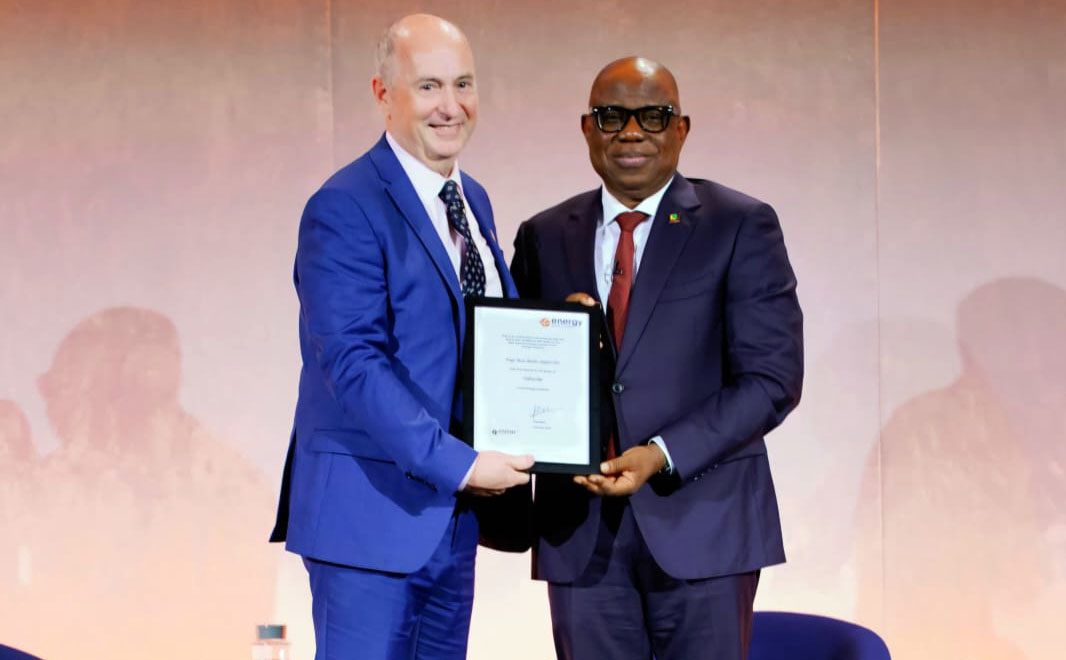
NNPC CEO Ojulari Receives Prestigious Energy Institute Fellowship in London
The Nigerian National Petroleum Company Limited (NNPC Ltd.) has earned international acclaim as its Group Chief Executive Officer, Engr. Bashir Bayo Ojulari, has been conferred with the Fellowship of the Energy Institute (FEI), United Kingdom — one of the highest honours in the global energy industry.
The Fellowship recognises senior energy leaders who have demonstrated sustained, high-impact contributions to the advancement of the energy sector. It was formally conferred on Ojulari during International Energy Week (IEW) in London, a leading platform for energy policy, finance, and industry leadership. (punchng.com)
The honour was presented by Andy Brown, President of the Energy Institute, who praised Ojulari’s transformative leadership of NNPC Ltd., highlighting his role in strengthening governance, embedding a performance-driven culture, and repositioning the company for long-term value creation.
Under his stewardship, NNPC Ltd. has implemented investor-focused reforms, enhanced operational excellence, and expanded strategic global partnerships, all contributing to increased confidence in Nigeria’s energy sector. The recognition reinforces NNPC’s ongoing transformation into a commercially driven, globally competitive, and transparent energy company.
READ ALSO:
- FCT Polls: CSO Situation Room Flags Late Voting, Vote Buying, Logistical Challenges
- ADC Defeats APC to Win First Polling Unit in FCT Area Council Election
- Trump Moves to Indefinitely Suspend Work Permits for Asylum Seekers
Significance for Nigeria and Africa
Experts note that the FEI Fellowship is not only a personal achievement for Ojulari but also a major institutional endorsement of NNPC Ltd.’s reform agenda. Being recognised at International Energy Week, which convenes policymakers, financiers, regulators, and industry leaders, positions the company at the centre of critical global energy discussions on sustainability, energy transition, and capital formation.
The award also signals growing international confidence in NNPC Ltd. and highlights Nigeria’s strategic role in Africa’s energy security and global energy transition ambitions. (vanguardngr.com)
Ojulari’s Leadership Achievements
Since assuming office, Engr. Ojulari has overseen multiple strategic reforms at NNPC Ltd., including:
- Driving governance and operational reforms to boost accountability.
- Expanding strategic partnerships and investor-focused initiatives.
- Enhancing execution efficiency across the company’s subsidiaries.
- Positioning NNPC Ltd. as a credible, investment-ready energy enterprise.
These efforts have not only improved the company’s profitability and performance but also strengthened Nigeria’s energy security and market competitiveness. (punchng.com)
Ojulari described the Fellowship as a reflection of collective effort within NNPC and reiterated his commitment to sustainable value creation, global best practices, and energy sector innovation.
NNPC CEO Ojulari Receives Prestigious Energy Institute Fellowship in London
News
FCT Polls: CSO Situation Room Flags Late Voting, Vote Buying, Logistical Challenges

FCT Polls: CSO Situation Room Flags Late Voting, Vote Buying, Logistical Challenges
The Nigeria Civil Society Situation Room has raised concerns over multiple irregularities in the ongoing Federal Capital Territory (FCT) Area Council Elections, citing late polling unit openings, reports of vote buying, and logistical challenges that could affect voter participation.
According to the Situation Room, a coalition of over 70 civil society organisations advocating for credible elections in Nigeria, many polling units opened late, with an average start time of 9:15 a.m., well after the official 8:30 a.m. schedule. Observers also noted low voter turnout in several areas, particularly in AMAC, although queues began forming later in Kuje, Kwali, Gwagwalada, and Abaji Area Councils.
Vote Buying Observed
The coalition reported instances of vote buying, with voters allegedly offered up to ₦10,000 in exchange for ballots in units such as PU008, PU056, PU057, and PU058 in Gidan Mangoro Ward, AMAC. While some of the transactions were open, others were conducted discreetly.
The Situation Room warned that such electoral malpractice undermines the integrity of the election and called on electoral officials, political parties, and security agencies to intervene and prevent further incidents.
READ ALSO:
- ADC Defeats APC to Win First Polling Unit in FCT Area Council Election
- Trump Moves to Indefinitely Suspend Work Permits for Asylum Seekers
- Peller Escapes Generator Fire at Lagos Home, Recalls Earlier Lekki–Epe Scare
Logistical and Accessibility Issues
Observers noted that some voters struggled to locate their polling units after last-minute changes communicated by INEC via text messages. The Bimodal Voter Accreditation System (BVAS) generally performed efficiently, with a one-minute average accreditation time, though malfunctions were reported in a few units including Gwako Town Primary Schools II & IV and PU143, Gwagwalada.
The Situation Room also highlighted accessibility challenges for voters with disabilities, noting that braille ballot guides, magnifying glasses, and other assistive materials were largely absent, even in designated disability communities such as Karimajiji and PU052, Wuse.
Security and Election Conduct
Security personnel, including officers from the Nigeria Police, Civil Defence, Immigration Service, and Fire Service, were present in significant numbers and generally maintained order and professionalism.
Isolated incidents of intimidation and harassment were reported in locations such as Grade 1 Area Court, Rubochi (Kuje); Naharati Sabo School II, Rimba/Ebagi; and PU3, UNG Liman/UNGWAR LIMAN 1, Abaji Central, but security agents swiftly resolved these situations.
Call for Calm and Integrity
The Situation Room commended the INEC FCT Help Desk for promptly addressing reported issues and called on all stakeholders to maintain calm, resist vote buying, and ensure that the will of the people is respected as the polls continue and results are collated.
The report was jointly signed by Mma Odi and Celestine Odo, co-conveners of the coalition.
FCT Polls: CSO Situation Room Flags Late Voting, Vote Buying, Logistical Challenges
News
Trump Moves to Indefinitely Suspend Work Permits for Asylum Seekers

Trump Moves to Indefinitely Suspend Work Permits for Asylum Seekers
United States President, Donald Trump, has introduced a sweeping immigration proposal that could halt the issuance and renewal of work permits for asylum seekers for many years, marking what analysts describe as one of the most consequential shifts in U.S. asylum employment policy in decades.
The proposed rule, released on Friday by the U.S. Department of Homeland Security (DHS), seeks to suspend new employment authorisation for asylum applicants until the average processing time for designated asylum cases falls to 180 days or fewer.
According to DHS data, the asylum case backlog now exceeds 1.4 million applications, with the department projecting that meeting the 180-day benchmark could take between 14 and 173 years under current conditions—effectively creating an indefinite suspension of asylum work permits.
Despite the bleak projections, DHS said administrative restructuring, staffing increases, and efficiency-focused reforms could eventually reduce processing delays. However, officials acknowledged that significant improvements would take time.
READ ALSO:
- Peller Escapes Generator Fire at Lagos Home, Recalls Earlier Lekki–Epe Scare
- Abuja Church Expels Newly Married Woman Over Refusal to Consummate Marriage
- Pastor Sentenced to Death by Hanging for Murdering Landlord in Akwa Ibom
In a statement accompanying the proposal, DHS said the rule, if finalised, “would reduce incentives for frivolous, fraudulent, or otherwise meritless asylum claims.” The department stressed that work authorisation is not an entitlement, but a discretionary benefit granted by the DHS secretary.
If implemented, the policy would generally bar migrants who entered the United States unlawfully from receiving new work permits or renewing existing ones while their asylum claims remain pending.
Limited exemptions would apply only to individuals who alerted U.S. border officials within 48 hours of arrival that they feared persecution, torture, or faced another urgent humanitarian threat.
The proposal forms part of a broader immigration clampdown under President Trump, who returned to office in 2025 after campaigning on stricter border enforcement and tougher asylum standards.
Throughout his campaign and early months back in office, Trump portrayed immigrants and asylum seekers as economic and security burdens, claims that critics argue are not supported by crime or labour market data.
Immigrant advocacy groups, civil rights organisations, and some Democratic lawmakers have criticised the proposal, warning that denying work permits could push asylum seekers into poverty, increase dependence on charities, and drive people into undocumented employment.
Legal experts also expect significant court challenges, arguing that the rule could weaken long-standing U.S. and international asylum protections and undermine due-process guarantees.
The proposal will undergo a 60-day public comment period once it is formally published in the Federal Register on Monday. The regulatory process could extend for months or even years, with the final outcome uncertain amid anticipated legal battles.
Until then, existing regulations governing asylum seeker work permits in the United States remain in force.
Trump Moves to Indefinitely Suspend Work Permits for Asylum Seekers
-

 Politics2 days ago
Politics2 days agoPeter Obi Launches ‘Village Boys Movement’ to Rival Tinubu’s City Boys Ahead of 2027
-

 International3 days ago
International3 days agoCanada Opens New Express Entry Draw for Nigerian Workers, Others
-

 News2 days ago
News2 days agoPolice to Arrest TikToker Mirabel After She Recants False Rape Claim
-

 Education14 hours ago
Education14 hours agoUTME: JAMB Clarifies Position on Hijab During Biometric Capture
-

 International2 days ago
International2 days agoEpstein, Ex-Israeli PM Named in Alleged Profiteering From Boko Haram Crisis
-

 metro3 days ago
metro3 days agoOsun Awards 55.6km Iwo–Osogbo–Ibadan Road Project to Three Contractors
-

 metro3 days ago
metro3 days agoOndo Monarch Killed as Bandits Strike Akure North
-
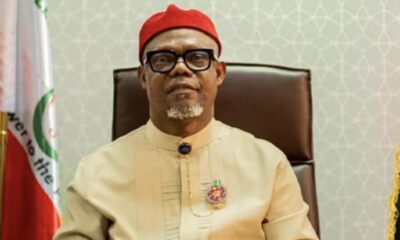
 Politics3 days ago
Politics3 days agoUpdated: Rivers Senator Mpigi Barinada dies at 64





